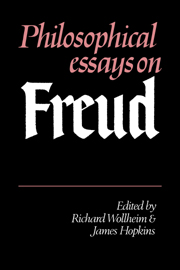Book contents
- Frontmatter
- Contents
- Introduction: philosophy and psychoanalysis
- 1 Conversations on Freud; excerpt from 1932–3 lectures
- 2 Freud, Kepler, and the clinical evidence
- 3 Critical empiricism criticized: the case of Freud
- 4 Freudian commonsense
- 5 Disposition and memory
- 6 On Freud's doctrine of emotions
- 7 The id and the thinking process
- 8 The bodily ego
- 9 Norms and the normal
- 10 On the generation and classification of defence mechanisms
- 11 Models of repression
- 12 Mauvaise foi and the unconscious
- 13 Self-deception and the ‘splitting of the ego’
- 14 Freud's anthropomorphism
- 15 Freud's anatomies of the self
- 16 Motivated irrationality, Freudian theory and cognitive dissonance
- 17 Paradoxes of irrationality
- Works of Freud cited
- Select bibliography
12 - Mauvaise foi and the unconscious
Published online by Cambridge University Press: 01 October 2009
- Frontmatter
- Contents
- Introduction: philosophy and psychoanalysis
- 1 Conversations on Freud; excerpt from 1932–3 lectures
- 2 Freud, Kepler, and the clinical evidence
- 3 Critical empiricism criticized: the case of Freud
- 4 Freudian commonsense
- 5 Disposition and memory
- 6 On Freud's doctrine of emotions
- 7 The id and the thinking process
- 8 The bodily ego
- 9 Norms and the normal
- 10 On the generation and classification of defence mechanisms
- 11 Models of repression
- 12 Mauvaise foi and the unconscious
- 13 Self-deception and the ‘splitting of the ego’
- 14 Freud's anthropomorphism
- 15 Freud's anatomies of the self
- 16 Motivated irrationality, Freudian theory and cognitive dissonance
- 17 Paradoxes of irrationality
- Works of Freud cited
- Select bibliography
Summary
The human being is not only the being by whom négatités are disclosed in the world; he is also the one who can take negative attitudes with respect to himself. In our Introduction we defined consciousness as ‘a being such that in its being, its being is in question in so far as this being implies a being other than itself’. But now that we have examined the meaning of ‘the question’, we can at present also write the formula thus: ‘Consciousness is a being, the nature of which is to be conscious of the nothingness of its being.’ In a prohibition or a veto, for example, the human being denies a future transcendence. But this negation is not explicative. My consciousness is not restricted to envisioning a négatité. It constitutes itself in its own flesh as the nihilation of a possibility which another human reality projects as its possibility. For that reason it must arise in the world as a Not; it is as a Not that the slave first apprehends the master, or that the prisoner who is trying to escape sees the guard who is watching him. There are even men (e.g. caretakers, overseers, gaolers) whose social reality is uniquely that of the Not, who will live and die, having forever been only a Not upon the earth. Others so as to make the Not a part of their very subjectivity, establish their human personality as a perpetual negation.
- Type
- Chapter
- Information
- Philosophical Essays on Freud , pp. 203 - 211Publisher: Cambridge University PressPrint publication year: 1982



